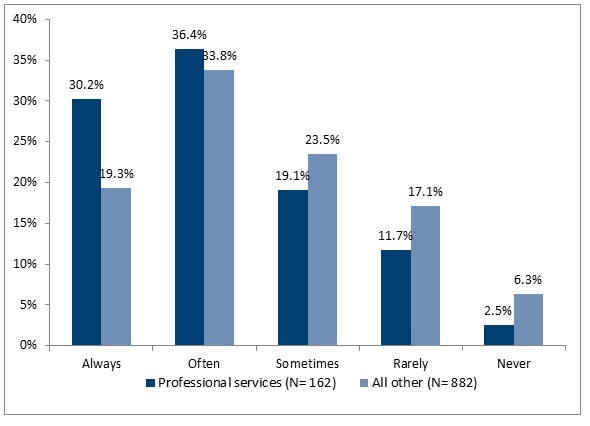Perhaps largely due to the nature of their business, professional services firms have high expectations, and consequently some struggles, when it comes to the demarcation of work and home life. Work tends to be ubiquitous, and employees often struggle with guilt if they take advantage of benefits like vacation and personal time off.
I work for an organization that has a lot in common with professional services firms. Recently, our HR executive director gave us four hours of free time during normal working hours to spend with family, go holiday shopping, or just rest, in honor of the holiday season. I chose to schedule this time off during the work week (as it was intended to be used), but was definitely cautioned to make sure that I get my work done first. Consequently, due to workload (and guilt), I found myself working most of the day that Sunday to make up for the time that I took off during the work week. Does this sound familiar to anyone?
Similarly, with vacation time, it is often difficult for employees, within the professional services industry as well as other industries, to utilize all of their vacation time. And it is often seen as a badge of honor for those employees to let significant amounts of vacation time go unused and expire at the end of the year. The thought goes something like this: “Oh, that vacation time is for others [who are in more of a support role, perhaps]. We [who are billable] can’t afford to spend all that time on vacation.”
The blurring of the lines between work time and personal time also recently came through in an analysis of APQC’s Envisioning the Workspace of the Future survey. A few months ago, APQC surveyed more than 1,000 people as part of a large-scale investigation of the modern work experience.
One of the scope areas in the survey was around work/life balance, and one question asked about the frequency with which survey respondents monitor or respond to work messages outside of normal working hours. Slightly over half the respondents report that they always or often monitor or respond to work messages outside of normal working hours. This number increases greatly for professional services organizations: Over two-thirds of professional services industry respondents report that they always or often monitor or respond to work messages outside of normal working hours.
Frequency of Monitoring or Responding to Work Messages Outside of Normal Working Hours

So, what are we to make of this data? Professional services employees, in particular, are knowledge workers whose livelihood depends on responsive and excellent service to their customers. In part, that is why they are glued to their e-mails more than other industries. But data like this also serves as a reminder to both employees and to their employers. For employees, it is a reminder that while work is a very important component of life, it is imperative to be efficient at work, keep life priorities in mind, and set some reasonable boundaries in order to enjoy true “time off.” For employers, it is a reminder to be sure that the execution of benefits like vacation and other types of time off are not unintentionally discouraged through culture, policy, and/or workload. Check in with your employees often to see how they are doing.
If you have any other thoughts or contributions to this issue, please reply to this post and share. And, as we embark on a fresh new year, let me express a sense of gratitude for work when so many others out there are still struggling, and wish you all a happy (balanced and guilt-free) new year and best wishes for a phenomenal 2017!